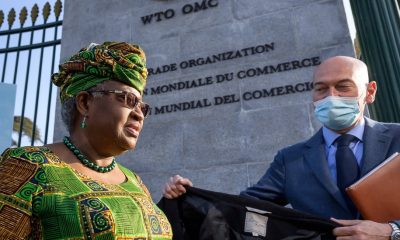Editorial
What does it mean to survive in Nigeria?

Nigeria, Africa’s largest economy and most populous nation, is a country where survival is a daily struggle. From the crowded streets of Lagos to the isolated rural villages in the north region, the quest for survival is a constant theme that resonates across all facets of life.
For many Nigerians, survival means waking up every morning without a guarantee of where the next meal will come from. It means braving the chaotic streets, navigating through gridlocked traffic, and facing the harsh realities of an economy in shambles.
As Nigeria’s current President, Bola Tinubu, took office in May 2023, hopes for a revival of the economy and better governance soared among many Nigerians.
Yet, more than a year into his administration, survival for the average Nigerian remains an arduous task. Tinubu’s regime, while embarking on reforms, has inherited deep-rooted economic challenges. For millions, navigating daily life has become a balancing act of overcoming inflation, job scarcity, and rising costs of basic necessities.
Survival under Tinubu’s government is not just about getting by—it’s about weathering a storm of policies, economic downturns, and systemic issues that make daily living a struggle.
A Country in Crisis: The Economic Landscape
Nigeria’s economy, though bolstered by its status as an oil-producing giant, is weighed down by inflation, high costs of living, and unstable markets. The National Bureau of Statistics (NBS) has painted a grim picture of the state of the economy, with inflation reaching 32.15% in August 2024. The cost of food, transportation, and essential goods continues to rise, outpacing the growth in wages. For many families, even basic necessities have become luxuries.
The price of a healthy diet, a measure tracked closely by the NBS, underscores the economic burden faced by ordinary Nigerians. The national average cost of a healthy diet stood at N1,255 per adult per day in August 2024, a staggering 28% increase from March of the same year. In wealthier states like Lagos, the cost climbs even higher, reaching N1,615 per day, compared to N880 in poorer northern states like Katsina. While this disparity highlights regional inequalities, the reality is that across the country, the rising cost of living has left many struggling to afford even a modest meal.
Inflation and Scarcity: The Food Crisis
One of the stark realities under Tinubu’s regime is the struggle to afford food. Nigeria, which once prided itself on its agricultural capacity, has seen food prices spiral out of control. The NBS reports that the cost of a healthy diet increased by 28% between March and August 2024, meaning the average adult needs N1,255 per day just to afford balanced meals. For most families, this is an unattainable amount. In urban centers like Lagos and Rivers, where the cost of living is already high, the price for daily meals goes up to N1,615, making survival even harder. For a country where over 40% of the population lives below the poverty line, this situation is catastrophic.
Staples like yam, maize, and palm oil have become luxuries for many. As food inflation hit 37.52% in August 2024, the poor are finding it difficult to meet even their basic nutritional needs. The hardest hit are the rural and low-income populations who make up a significant portion of Nigeria’s populace. For these individuals, subsistence is no longer guaranteed through farming or informal trade. Instead, survival depends on finding creative ways to stretch limited resources, often going hungry or skipping meals.
Employment Woes and Unstable Incomes
The Nigerian labour market offers no reprieve from the harsh economic environment. While the official unemployment rate for Q1 2024 stands at 5.3%, this number masks deeper problems.
The employment-to-population ratio, which stood at 73.2%, reveals that many of those working are underemployed, toiling in low-paying jobs with insufficient hours. The self-employment rate, traditionally high in Nigeria, fell to 84% in Q1 2024, reflecting the waning opportunities in the informal sector.
In rural areas, where 91.9% of the workforce relies on self-employment, the situation is particularly bleak. As agricultural outputs struggle under the weight of poor infrastructure, climate change, and market volatility, many rural workers are finding it difficult to maintain a sustainable income.
Transportation Costs: An Unaffordable Journey
For many Nigerians, transportation is both a necessity and a financial burden. The price for a bus ride within cities, which many depend on to commute to work, rose from N942.61 in July 2024 to N869.35 in August. Intercity travel also spiked, with fares increasing by 0.59%, pushing it to N7,159 per trip.
Airfares, while generally out of reach for most Nigerians, saw a staggering 56.56% increase, with an average cost of N123,700 per flight. Even motorcycle rides, often the transportation of last resort for many in urban and rural areas alike, saw fares rise to N524.22 in August.
As fuel prices more than doubled, the cost of living increased across every sector, with businesses raising their prices to cope with rising transportation and production costs. This surge in transportation costs not only cuts into household budgets but also restricts the mobility of workers seeking employment or business opportunities, further entrenching the economic divide between regions. The average Nigerian saw their wages remain stagnant, making survival a day-to-day hustle.
The Thin Line Between Progress and Hardship
Tinubu’s administration has introduced several reforms aimed at reviving the economy, including the unification of the exchange rate system and efforts to attract foreign investment. While these moves are necessary for long-term economic stability, the immediate effect on the average Nigerian has been harsh. The removal of fuel subsidies, in particular, has hit the poorest the hardest. It’s a gamble that aims to reduce government debt and improve infrastructure in the long run, but for now, it has increased the cost of everything from food to transportation.
For many Nigerians, the pain of these reforms feels like a punishment. The promises of a better tomorrow are overshadowed by the stark reality of rising living costs today. Tinubu has spoken of the need for sacrifice, but for those already living on the margins, this is a difficult pill to swallow.
Survival in Urban Nigeria: The Lagos Experience
In cities like Lagos, survival is a constant hustle. With over 15 million people jostling for limited resources, the pressure to earn a living is immense. Traffic gridlock, daily power outages, and water shortages are part of everyday life for many. Jobs in the formal sector are scarce, and most residents depend on informal trade or side hustles to get by. Street vendors, artisans, and small business owners make up a significant portion of the workforce, but even they are feeling the pinch.
Rent in Lagos has become unaffordable for most low-income earners, forcing many into overcrowded, substandard housing or even homelessness. For those lucky enough to have jobs, a significant portion of their income goes toward transportation, leaving little left over for food or savings. The removal of the fuel subsidy has hit these individuals the hardest, as their daily costs have risen without any corresponding increase in wages.
Rural Nigeria: A Different Kind of Struggle
In rural areas, the challenges are different but no less severe. Agriculture, the mainstay of the rural economy, is facing a myriad of problems, including poor infrastructure, lack of access to credit, and unpredictable weather patterns due to climate change. Farmers struggle to produce enough food to feed their families, let alone sell at a profit. With transportation costs increasing, it has become harder to move goods to urban markets, further exacerbating rural poverty.
Despite these challenges, rural Nigerians are known for their resilience. Communities often band together to support each other, sharing resources and pulling together in times of crisis. While this spirit of communal support has helped many survive, it is not a substitute for the structural reforms needed to lift rural areas out of poverty.
A Country at a Crossroads
As Tinubu’s government approaches the halfway mark of his term, Nigeria stands at a crossroads. The country has immense potential, but without swift and targeted action, the economic situation may worsen for millions of citizens. While the administration’s policies may pay off in the long run, the short-term sacrifices required are squeezing the average Nigerian’s ability to survive.
Survival in Nigeria is not just an individual struggle; it is a national one. For millions of Nigerians, the hope for a better tomorrow is often overshadowed by the need to make it through today.
Until the economic landscape stabilises and the government takes meaningful steps to curb inflation, provide jobs, and reduce the cost of living, the daily struggle for survival will continue.
In Nigeria, survival is more than a battle against poverty—it is a battle for dignity, for hope, and for the future. The question remains: how long can the Nigerian people continue to survive under such immense pressure?
In the words of a Lagos street vendor: “We are surviving, but we are barely living.”
You may like
-
Tinubu hails Okonjo-Iweala’s WTO reappointment
-
‘E sweet me well well…..’: Tinubu, France President Macron breaks diplomatic norms
-
Tinubu commits to returning out-of-school children to classrooms
-
Tinubu commences state visit to Paris
-
Tinubu, wife to visit France on Macron’s invitation
-
Atiku is an active player in democracy; Tinubu extols former VP at 78
-
Tinubu not presenting 2025 budget Wednesday- NASS
-
FG to diversify economy through creative industry
-
Labour Party Dismisses Allegations of Partnership with Tinubu for 2027 Elections
-
You can’t fire somebody you didn’t employ—Odoh to Tinubu
-
AMGA 2024: Tinubu charges military to address insecurity in Africa
-
Tinubu should be blamed for PDP crisis – Sowunmi
Editorial
What if Donald Trump loses?

Much of the outside world’s focus during the 2024 US election has been on what victory for Donald Trump might look like, but many Americans are fretting about the opposite outcome — including some of his most vocal opponents.
The Republican ex-president, who is in a dead heat with Democrat Kamala Harris in the race for the White House, has never acknowledged the legitimacy of his election defeats — from the 2016 Iowa primary to his presidential contest in 2020.
His denialism deeply polarized the country last time around, and his continued attempts to sow distrust in US democracy have sparked fears of a repeat of the violence seen during the 2021 storming of the US Capitol.
“Should he lose this year, I have no doubt that he will claim fraud, leave no stone unturned to reverse the results, and refuse to attend Harris’s inauguration,” said Donald Nieman, a political analyst at Binghamton University in New York state.
“He’s not only a sore loser, he’s someone who will never admit he lost.”
Trump’s rap sheet demonstrates that it is not beyond him to try to cheat in elections.
He has 34 felony convictions for a scandal involving covered-up payments to silence a porn star he feared was about to wreck his 2016 campaign with a salacious story about a sexual encounter.
And he has been indicted twice and impeached twice over alleged efforts to steal or otherwise cheat in the 2020 election, which he still has not conceded.
Rejected by the American people four years ago, Trump and his allies flooded the zone with bogus claims of irregularities and fraud.
– Deadly riot –
Trump’s critics worry about a repeat of the violence that resulted from those lies — a deadly riot by an angry mob summoned to Washington by Trump, pumped up by his claims of voter fraud and sent marching on the Capitol.
Especially since he’s at it again.
“If I lose, I’ll tell you what, it’s possible because they cheat. That’s the only way we’re going to lose — because they cheat,” the 78-year-old told rally-goers in Michigan last month.
Trump has been dusting off the same baseless concerns over the legitimacy of vote counts, foreigners voting, the reliability of mail-in ballots and much else.
The ex-president and his allies set the stage for the 2021 riot through legal means — more than 60 lawsuits largely complaining about the way state and local authorities had changed voting rules to take account of a raging pandemic.
But they lost every substantive case, with judges ruling that objections to election organization should have been lodged long before the first ballot was cast.
Republicans hit the ground running this time around, filing more than 100 lawsuits before early voting began about every aspect of the election, from how Americans register and cast ballots to who can vote.
Many of the suits seek to limit access to the polls and most will be unresolved by Election Day, but experts say this plays into distrust over vote-counting that Trump and other conspiracy theorists have spent years exacerbating.
– ‘Sporadic violence’ –
“The legal skirmishes might drag on for weeks, and depending on their intensity, could lead to protests or even sporadic violence in certain areas,” said political analyst Adrienne Uthe, the founder of Utah-based PR firm Kronus Communications.
Almost two-thirds of Americans are anticipating post-election violence, a Scripps News/Ipsos poll out Thursday found, and most support using the military to quell unrest after polls open on November 5.
More than a quarter believe that civil war could break out, according to a new YouGov poll, with 12 percent saying they know someone who might take up arms if they thought Trump had been cheated.
The intelligence community raised concerns about the potential for bloodshed in a report on election threats from foreign actors that was declassified, redacted and released last week by the Office of the Director of National Intelligence.
“Foreign-driven or -amplified violent protests, violence, or physical threats… could challenge state and local officials’ ability to conduct elements of the certification and Electoral College process,” it said.
Security measures have been beefed up in Washington in anticipation of potential unrest, although analysts contacted by AFP saw a repeat of the 2021 insurrection in the capital as unlikely, with hundreds of subsequent prosecutions acting as a potent deterrent.
But they warned of the potential for violence in the battleground states during and after the election.
“My biggest fear is violence in Madison, Wisconsin; Lansing, Michigan; or Harrisburg, Pennsylvania by armed Trump supporters designed to prevent electors from casting their votes,” said Nieman.
Editorial
Nigeria among African countries with governance deterioration since 2014—Report

Nigeria has been ranked among the African countries that have experienced the most substantial decline in governance performance since 2014 over the past decade, according to the 2024 Ibrahim Index of African Governance (IIAG) on Wednesday.
IIAG, which tracks governance performance across 54 African countries, shows that from 2014 to 2023, Nigeria’s overall governance score dropped by three ranks, with the country now positioned 33rd out of 54 African nations.
The most significant decline for Africa’s most populated country was in the “Security & Safety” sub-category, where the country’s score fell by 11 points over the decade.
This places Nigeria among the bottom five nations in Africa for security and safety in 2023. A notable indicator within this category is the “Absence of Armed Conflict,” where Nigeria’s score dropped by 49.8 points, making it the fifth most deteriorated country in this measure.
Nigeria’s ongoing violence, insurgencies, and internal conflicts are the primary factors contributing to the country’s rapid decline in security, as the country has faced persistent challenges with terrorism, banditry, and communal clashes, affecting its governance performance in this critical area.
In addition to security, the report also noted that Nigeria has recorded declines in 10 out of 16 governance sub-categories.
Among the areas hit hardest are “Participation, Rights & Inclusion” and “Accountability & Transparency,” both of which reflect challenges in ensuring citizen participation and holding public officials accountable.
The IIAG report reads, ” At Overall Governance level, Nigeria ranks 33rd in 2023 withn a score of 45.7, falling by three ranks, and follows a trend of increasing deterioration.
“At sub-category level, Nigeria reports declines in 10 out of 16 sub-categories, five of which larger than -5.0 points.
“The largest is Security & Safety, declining by -11.0 points, thus placing Nigeria in the bottom 10 most declined countries over the decade and in the bottom five lowest scoring countries in 2023 for this sub-category.
“At indicator level, Nigeria reported concerning declines within Absence of Armed Conflict, declining by -49.8 points, making Nigeria the fifth most declined country within this indicator and the lowest ranked country in 2023 (54th).”
Despite these setbacks, the report also points out some positive trends across the continent, with 13 other countries having made progress in Overall Governance.
They include the Congo Republic, Côte d’Ivoire, Egypt, Equatorial Guinea, Eritrea, Gabon, Libya, Madagascar, Malawi, Morocco, Somalia, Togo, and Zambia.
According to the IIAG report, these countries account for more than one-fifth (20.5%) of the continent’s population, and progress is accelerating in the second half of the period.
Like Nigeria, nations such as Botswana, Burkina Faso, Eswatini, Guinea, Mauritius, Mozambique,
Nigeria, Senegal, Sudan, Tunisia, and Uganda have also seen their governance deteriorate, particularly in the areas of security and rule of law.
“The 2024 IIAG paints a picture of stagnation in Africa’s Overall Governance performance between 2014 and 2023. With a score of 49.3 in 2023, progress has been limited to +1.0 with almost no change from 2018 and coming to a complete stop in 2022,” the report reads.
“Over the decade, 33 countries, hosting just over half (52.1%) of the continent’s population, have made progress in Overall Governance. For 13 of them – Congo Republic, Côte d’Ivoire, Egypt, Equatorial Guinea, Eritrea, Gabon,
Libya, Madagascar, Malawi, Morocco, Somalia, Togo, Zambia – hosting over 1/5th (20.5%) of the continent’s population, progress is even accelerating over the second half of the period.
“But for the remaining 21 countries, hosting 47.9% of the population, the Overall Governance level is worse in 2023 than in 2014. For 11 of those – Botswana, Burkina Faso, Eswatini, Guinea, Mauritius, Mozambique,
Nigeria, Senegal, Sudan, Tunisia, Uganda – home to almost 1/3 (29.3%) of the population, deterioration is even worsening over the second part of the decade.
“This concerning overall trend is driven by the ongoing deterioration of the Security & Rule of Law dimension, which has been the most deteriorated category since 2014 (-1.6 points), as well as, to a lesser extent, by the irregular
trajectory of Participation, Rights & Inclusion, ending with a loss of -0.2 points between 2014 and 2023. Within these categories, deterioration is worst in both Security & Safety and in Participation, with a loss of -5.0 and -4.5 points, respectively, while Rights (-2.8) and Accountability & Transparency (-1.4) also decline, but to a lesser extent.
“Meanwhile, Human Development (+2.9) and Foundations for Economic Opportunity (+2.8) improved over the decade under review, but progress has ultimately slowed from 2019. This slowing improvement trend applies to all underlying sub-categories of these two categories since 2019, with the exception of Health, which still managed to accelerate progress, and Social Protection & Welfare, which remained unchanged.”
The 13 countries with increasing improvement are Congo Republic, Côte d’Ivoire, Egypt, Equatorial Guinea, Eritrea, Gabon, Libya, Madagascar, Malawi, Morocco, Somalia, Togo, and Zambia
Botswana, Burkina Faso, Eswatini, Guinea, Mauritius, Mozambique, Nigeria, Senegal, Sudan, Tunisia, and Uganda are among the 11 countries whose conditions are deteriorating.
The 11 countries with warning signs include Algeria, Cabo Verde, Central African Republic, Chad, Ethiopia, Gambia, Ghana, Guinea-Bissau, Rwanda, São Tomé and Príncipe, and Zimbabwe.
The nine countries with slowing improvement are Angola, Benin, Djibouti, Kenya, Liberia, Mauritania, Seychelles, Sierra Leone, and Tanzania.
Cameroon, Comoros, DR Congo, Mali, Namibia, Niger, and South Africa are the seven countries with slowing deterioration, while the three countries with bouncing back are Burundi, Lesotho, and South Sudan.
Editorial
Cooking gas: continuous increase affecting our purchasing power – Nigerians

The price of Liquefied Petroleum Gas (LPG), commonly known as cooking gas, continues to rise, causing Nigerians to express concern about its impact on their expenses.
Many residents of the Federal Capital Territory (FCT), said this in an interview with the News Agency of Nigeria (NAN) in Abuja on Sunday.
NAN reports that 1kg of cooking gas is being sold for between N1,260 and N1,500 depending on the location, and refilling a 12.5kg cylinder costs between N15,750 and N18,750 as opposed to 12,500 to N13,000 in June and July.
The National Bureau of Statistics (NBS) latest cooking gas report for September showed that the average retail price for refilling a 5kg Cooking Gas cylinder increased by 4.19 per cent on a month-on-month basis from N6,430.02 recorded in August 2024 to N6,699.63 in September 2024.
Also, the average retail price for refilling a 12.5kg Cylinder Cooking Gas increased by 4.89 per cent on a month-on-month basis from N15,552.56 in August 2024 to N16,313.43 in September 2024.
Mr Nnamdi Opara, a businessman and father of two said he had to adjust his spending to accommodate the increase in cooking gas price.
“ When the prices of things increase, I just try to adjust to accommodate that thing, especially if it is a necessity like cooking gas.
“ I have a 12.5kg cylinder, but I have not filled it to that capacity for some time. So I buy like 5kg or a little more depending on the money I have.
“If I use just N16,000 to buy gas, then I won’t be able to meet other needs; it is not like income has increased, and we all know the situation of the economy.
“Government’s intervention is urgently re so Nigerians can breathe because we are not breathing,” he said.
Mrs Memunat Ogunyemi, a civil servant, said the increase in cooking gas had made some people return to traditional cooking options.
“I remember when the government was sensitising Nigerians on the need to stop deforestation and embrace the use of cooking gas.
“ I discouraged my mum and some of my family members from using charcoal and Kerosene, explaining to them that gas is faster and cleaner.
“At that time 12.5 cylinder of gas was N6,500. Today, that same size of cylinder is about N16,000 to N17,000, depending on your location.
“How many people can afford to buy it coupled with other expenses like food and transportation? My mum has gone back to using charcoal and I also use a charcoal stove as an alternative now.”
Ogunyemi added that the prices of accessories like cylinders, hose regulators, etc, had also increased.
Mrs Ella Joshua, a nurse and mother of three, said she could no longer afford to fill her 12.5kg cooking gas because of the continuous price increase
“I have not been filling my 12.5kg for a long time because I can not afford it, I only manage to fill 6kg per time.
“I resort to cooking with charcoal if I have many dishes/food to cook, but unfortunately, the price of charcoal is skyrocketing too as a bag is currently sold at N10,000.
“The government needs to hear the cries of Nigerians, the suffering is just too much,” she said.
Similarly, Mrs Happiness John, a businesswoman said she had to use a charcoal stove as an alternative because of the increasing cost of cooking gas.
“I have a charcoal stove which we put behind the house and use to boil things like tomatoes, beans and cow tail because they take longer to cook.
“I cannot afford to use gas alone to cook, not when the present cost of 12.5kg is selling for N16,500 now in my area.”
Mr Kareem Mohammed, a Manager at a gas station attributed the increase in cooking gas to low supply, adding that the local production was not sufficient to meet the demand.
“The Federal Government should address this issue of cooking gas production to ensure we produce enough here in Nigeria to meet the demands of the people,” he said.
NAN recalls that the National Assembly recently called on the Federal Government to reverse the recently increased prices of cooking gas and petrol.
The call followed a resolution to a motion by the Minority Leader, Rep. Kingsley Chinda (PDP-Rivers), at plenary.
According to Chinda, the rising cost of petrol and cooking gas poses a significant threat to the livelihoods of millions of Nigerians and unchecked inflationary pressure caused by the increased prices
This Chinda said can lead to social unrest, increased poverty rates, and negative long-term economic effects.
Experts have said the Federal Government needs to boost local production of LPG and address the foreign exchange issues to make importing the product cheaper so it becomes more affordable and accessible to Nigerians.
Editorial
Nigerians sacrifice cars as cost of living crisis worsens

Nigeria’s economic crisis and soaring petrol prices forced Bolaji Emmanuel to give up his driver and his Honda Pilot utility vehicle as he struggles with spiking living costs.
Emmanuel is not alone. Many in Africa’s most populous country are abandoning their cars as the costs strain disposable income.
The price of petrol has risen more than fivefold since President Bola Tinubu took office in May 2023.
“I parked it at my son’s house. I use public transport now,” Emmanuel, a 72-year-old retired health worker, told AFP. “It is not convenient, but it is what the economy demands.”
Since coming to power, Tinubu has ended a costly fuel subsidy and freed up the naira currency, in reforms that government officials and analysts say will revive the economy and attract investors.
But in the short term, Nigeria has seen one of its worst crises in decades with inflation at a three-decade high.
A litre of petrol sold for around 195 naira just before Tinubu took office. The price rose to at least 998 naira ($0.61) per litre in Lagos and 1,030 naira in the capital, Abuja, at the beginning of October. It can go for as much as 1,300 naira elsewhere.
Inflation reached an almost three-decade high of 34.19 percent in June. It has since slowed to 32.7 percent in September.
The slump in purchasing power is piling more hardship on locals, with more than 40 percent of the population living in poverty, according to the World Bank. That figure is expected to rise in 2024 and 2025, before it stabilises in 2026.
The Nigerian middle class, which made up about 20 percent of the population in 2020, now readily sacrifices the comfort of private cars for survival.
Car dealers in Lagos and Abuja told AFP that they had seen more and more people trading their fuel-guzzling cars and sports utility vehicles (SUVs) for more efficient vehicles to cut costs.
“People are actually selling their big cars these days,” Maji Abubakar, a car dealer in Abuja, told AFP. “The problem is that even if you put them on the market, there isn’t much demand for them.”
“It has been more than a year since I sold a car with an eight-cylinder engine, and the major reason is the price of petrol,” he added.
With fewer cars on the road, even the notorious Lagos traffic, known as “go-slow”, has thinned out.
– Used or Chinese cars, bicycles –
Elijah Bello, a tech entrepreneur in the southern state of Ogun, has looked for a buyer for his Lexus RX 350 SUV for months.
He has since bought a smaller, energy-saving Toyota Corolla to replace it.
The trend, which began last year, “will intensify” and “we will see fewer cars on the roads”, said Bunmi Bailey, head of research at SBM Intelligence risk consultancy.
Bailey can fill his small car for 55,000 naira. “I can use it for two weeks for my normal home-to-work movement,” he told AFP, while his larger car consumes 110,000 naira worth of petrol in just eight days.
The market for new cars has dropped by 10 to 14 percent in the last year, said Kunle Jaiyesinmi, deputy director at the Lagos-based CFAO Group, which specialises in automobile distribution.
“An SUV that sold for 40 to 45 million naira ($24,000 to $27,000) about two years ago, for now, if you want to negotiate the price, you see that it is within the range of 95 or 100 million ($57,000 to $60,000),” Jaiyesinmi told AFP.
But unyielding inflation and high exchange rates are steering more middle-class people away from used Japanese- and American-brand cars, toward increasingly popular Chinese-made ones.
Some are turning to bicycles, despite the lack of appropriate infrastructure in cities like Lagos, where car crashes are common.
“Sure, we notice (a rise in) cycling… for months since the fuel hike,” said Femi Thomas, head of FT Cycle Care, a Lagos-based organisation that promotes cycle use.
Food delivery platform Glovo said it had recorded a growing interest in bicycle deliveries among its riders.
About 20 percent of orders are delivered by bike, Chidera Akwuba, the group’s public relations manager in Nigeria, told AFP.
Editorial
The rise and rise of NPFL!

The Nigeria Premier Football League (NPFL) is on the rise and has undergone a remarkable transformation in recent years, largely thanks to the unwavering commitment of strategic partners to the NPFL, GTI Group.
By laying down robust structures for transparency and accountability, GTI Group has significantly helped to improve the integrity and reputation of the elite league, ensuring that every dime from sponsors and investors of The Nigeria Football Fund (TNFF) are meticulously utilised and accounted for.
GTI’s initiative to enhance transparency in the NPFL goes beyond mere intentions; it involves concrete actions that laid the groundwork for accountability.
This commitment not only bolsters the league’s financial health but also promotes confidence among stakeholders, including fans, sponsors and players.
One of the critical challenges that faced the NPFL before the coming of GTI Group in the 2022/2023 season was crowd violence. However, the financial investment firm and the NPFL Board led by Hon. Gbenga Elegbeleye have worked harmoniously and tackled this issue head-on by implementing measures to curb this menace at match venues.
The placement of trained security personnel, implementation of zero tolerance to crowd violence and the issuance of fines against erring clubs cum their fans have fostered a safer environment for lovers of the beautiful game in the country.
As a result, match attendance has astronomically increased, allowing for a more vibrant and supportive atmosphere.
The enhanced transparency in match operations by NPFL has also sparked renewed hope and a sense of friendly competition among clubs.
With the increase in fair play and adherence to regulations, fans and players alike are experiencing a new wave of excitement.
This was exemplified on Match Day 3 of the ongoing 2024/2025 season, where the league witnessed an impressive display of five-star performance: five away wins, three draws, and two home wins.
This feat has never happened in the history of the elite league and reflects the blossoming football economy of Africa’s most populous nation.
GTI Group and NPFL’s relentless effort has laid the foundation for a prosperous league that attracts local and international talents from neighbouring countries in the round-leather game.
By focusing on transparency, infrastructural development and security, GTI and NPFL are not just transforming the league; they are creating a sustainable environment where football can thrive.
As we celebrate these positive changes, it is essential to acknowledge the role of every stakeholder in this journey.
The NPFL is no longer just a platform for entertainment; it is a thriving business-oriented industry with the potential to inspire generations to come.
The transformation of the NPFL, championed by GTI Group, reflects a brighter future for Nigerian football. With the ongoing commitment and collaboration, the NPFL will continue to flourish, bringing glory to clubs and excitement to fans across the world.
Editorial
Young 9ja Boys and Murder: A Cry for Help

The term “Yahoo,” once associated with a popular email service (Yahoo Mail), has now become synonymous with internet fraud and cybercrime in Nigeria. It refers to a range of online scams predominantly perpetrated by young Nigerian men, often targeting unsuspecting individuals and businesses, particularly in Western countries.
In neighbouring Ghana, these fraudsters are known as “Sakawa boys,” a term derived from the Hausa language. The origins of “Yahoo” fraud trace back to the early 2000s, though they are seen as descendants of the infamous “419 scammers,” who initially used letters and then email scams to promise financial rewards in exchange for advance fees. The number “419” itself is derived from a section of the Nigerian Criminal Code that pertains to fraud.
However, the criminal activities of Yahoo Boys have now expanded beyond simple internet scams. The intersection of cybercrime, ritual killings, and deep-seated cultural beliefs has created a dangerous phenomenon in Nigeria, one that has had tragic consequences for its victims and a profound impact on Nigerian society.

The Appeal of Yahoo Boys
The allure of becoming a “Yahoo Boy” lies in the prospect of acquiring quick and substantial wealth. In a country plagued by high unemployment, economic instability, and limited job opportunities, many young Nigerians view internet fraud as a way out of poverty.
For some, the internet offers the chance to connect with potential victims across the globe, increasing their chances of success. This path, though illegal and immoral, often appears easier than the daily struggle for survival in a harsh economic climate.
Yet, the consequences of this criminal lifestyle are far-reaching, extending beyond financial gain. The rising culture of materialism, combined with societal pressures to achieve wealth, has led some Yahoo Boys to resort to extreme measures, including ritual killings, to enhance their fortunes.

Ritual Murders: A Dark Side of Yahoo Fraud
In Nigerian society, certain traditional beliefs hold that rituals involving human sacrifice can bring wealth, power, or success. This belief, combined with the desperation of young men seeking to enrich themselves, has contributed to a horrifying increase in ritual killings. Victims, often young women or children, are seen as possessing qualities that can be “harvested” for ritualistic purposes.
One such tragic case was that of Jennifer Anthony, a university student who was reportedly murdered by her “Yahoo Boy” boyfriend. Her gruesome death, which involved the removal of her eyes and other body parts, pointed to a ritual killing motivated by the desire for wealth.
Jennifer’s death is just one in a long line of similar incidents where individuals—often women—are targeted for ritual purposes, with promises of material gain driving these heinous acts.
Similarly, the murder of Damilola Olowoyo, a 17-year-old undergraduate at the Federal University, Lokoja, shocked the nation. Her alleged killer, Jeremiah Awe, reportedly lured her into a bush, drugged her, and killed her for ritual purposes.
In a particularly disturbing twist, Jeremiah then contacted her parents, demanding a ransom under the pretence that she had been kidnapped, using the money for his ritualistic pursuits. This case underscores how modern technology, such as social media platforms like TikTok, has made it easier for criminals to connect with and exploit individuals.
High-Profile Cases of Ritual Killings
Ritual killings, often associated with the Yahoo Boys phenomenon, have taken a distressing turn, with an alarming rise in such cases in recent years. Some prominent examples include:
- Mojisola Awesu, a 21-year-old graduate of the Kwara State College of Health Technology, who was lured to a hotel under the guise of attending a party and murdered by four men. Her death, for a meager sum of N15,000, was another chilling reminder of the lengths to which some criminals will go for ritual purposes.
- In Ibadan, Oyo State, a middle-aged man, Alfa Ahmed, brutally murdered his visually impaired grandfather and ill uncle in a ritual killing intended to bring him wealth.
- Ridwan, a 20-year-old man from Ogun State, made headlines in 2023 for killing his own father as part of a ritual designed to bring financial success.
These cases, among many others, paint a disturbing picture of a society grappling with a dangerous mix of modern technology and ancient, superstitious beliefs.

Gender Imbalance and Vulnerable Victims
A particularly troubling aspect of this trend is the overwhelming number of female victims in ritual killings. Women and girls are often targeted, with civil society groups and local media reporting an increasing threat to their safety.
Statistics from the West African Network for Peace Building reveal that between January 2021 and January 2022, Nigeria recorded 185 ritual-related deaths. Of these, 43 were women and 30 were children, highlighting the disproportionate vulnerability of women to these crimes.
The Societal Impact of Yahoo Boys and Ritual Killings
The activities of Yahoo Boys, especially when intertwined with ritual killings, have had a profound impact on Nigerian society. These crimes erode trust, undermine the rule of law, and perpetuate a culture of violence and impunity. Victims and their families are left traumatised, while the broader society grapples with the moral decay that has allowed such crimes to flourish.
At the heart of this crisis lies a breakdown in traditional values. The desire for quick wealth has replaced principles of hard work and integrity, and the moral fabric of Nigerian society appears to be unravelling. The rise of ritual killings, fueled by the activities of Yahoo Boys, represents not just a criminal issue but a deep-seated societal problem that demands urgent attention.
The Need for Immediate Action
Addressing the rise of Yahoo Boys and ritual killings requires a multifaceted approach. First, law enforcement must be strengthened, and the legal system needs to ensure that perpetrators of these crimes are swiftly brought to justice. Additionally, community education and awareness campaigns should aim to dispel the myths surrounding ritual sacrifices and address the root causes of desperation that drive young men into criminal activity.
Efforts must also be made to create economic opportunities for Nigeria’s youth, reducing the allure of quick and illegal gains. Programmes focusing on skill development, entrepreneurship, and education can provide alternative pathways for young people, steering them away from lives of crime and violence.
Finally, there must be a renewed commitment to strengthening traditional values of integrity, hard work, and respect for human life. Only through concerted effort and societal change can Nigeria hope to reverse the dangerous trend of ritual killings and Yahoo fraud that threatens to destabilise the country.

2025: How To Plan A Budget For The Upcoming Year

Ruud van Nistelrooy Opens Up on Hurtful Manchester United Exit Before Taking Leicester City Job

Obasanjo would have died under Abacha if not for me -Gowon

Why I don’t trust any public institution in Nigeria – Fisayo Soyombo

Minimum Wage: Cross Rivers Workers to embark on indefinite strike

Bayer Leverkusen Forward Victor Boniface Faces Possible Sanction for Reckless Driving Incident

Radda approves N70,000 minimum wage for Katsina workers

PH refinery has not commenced bulk sales – NNPC

CBN issues Dec. 1, ultimatum against banks, ATM delays
























